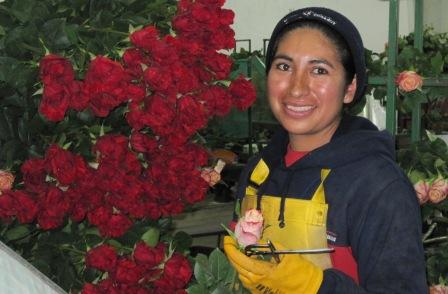Center for Fair & Alternative Trade
Path Breaking Research on Fair Trade Flowers

Posted: Summer 2010.
CFAT is conducting exciting new research on Fair Trade flowers produced in Ecuador for sale in the United States. It is the first ever research project on Latin American Fair Trade flowers and the first comprehensive investigation of Fair Trade’s impacts on waged workers in the region.
Currently, the most rapidly growing Fair Trade products – flowers, bananas, citrus, and other fresh produce – are grown on large enterprises. The challenge for Fair Trade in this arena is to transform the historically exploitative plantation production system, making it a source of living-wages and stable employment for rural workers, many of whom would otherwise have to migrate to urban areas to survive.
Since their launch in the United States in 2007, Fair Trade flower sales have increased dramatically. In 2009, the US imported nine million Fair Trade flowers and demand continues to rise. Given this growth in the sale of Fair Trade plantation products, the time has come for a systematic study of Fair Trade’s impacts on social and environmental conditions in large-scale enterprises. The goal of this research project is to assess how successful Fair Trade, which was designed to address the needs of peasant producers, is in transforming wage labor conditions and empowering workers.
Historically, the majority of workers in the cut-flower industry have been women. In Ecuador, for example, women make up about 60% of the flower workforce. Due to gender discrimination and lack of legal protections, women are typically the most vulnerable employees. On flower plantations, women often suffer from lower wages, sexual harassment, and high levels of unjustified dismissals. In addition women flower workers (including pregnant women) often encounter unsafe working conditions, including exposure to pesticides, and are forced to work extensive overtime hours in peak seasons or lose their jobs.
Fair Trade is working with plantation owners to end these exploitative practices and provide female and male employees with a living wage, pension and health benefits, and a social premium to be invested in development projects. Due to the heavy use of pesticides in flower production, flower plantations have often negatively impacted local communities. Fair Trade provides incentives for plantations to improve their management practices and curtail their use of chemical pesticides. It also provides a social premium managed by the workers to invest in education, housing, and other programs that improve the impacts of flower estates on surrounding communities.
This project represents an exciting expansion of CFAT’s research activities and our understanding of fair and alternative trade networks. We aim for the project to have strong societal impacts, providing access to needed information and pointing to avenues for strengthening existing programs that seek to ameliorate potential negative consequences of international trade. Project findings will be disseminated broadly to US and Ecuadorian academics, policy-makers, practitioners, and concerned citizens. The research team is led by CFAT co-director Laura Raynolds and assisted by CFAT graduate student Erica Schelly. Funding is generously provided by the National Science Foundation (NSF).
Back to home